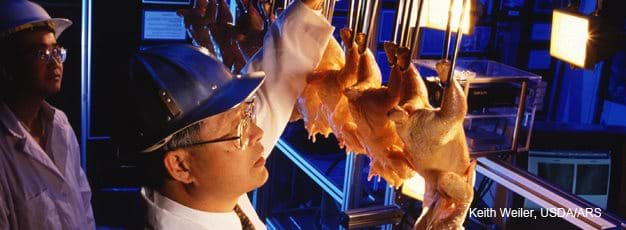For Most Meat and Poultry Plants, Federally Mandated Controls Are Just the Starting Point for Food Safety

Most U.S. meat and poultry processors go beyond the requirements of Government-mandated food safety controls and supplement these controls with their own standards. But for some meat and poultry plants, mandated controls are the only food safety actions, an ERS study found.
The study examined the effects of mandatory Government food safety practices, called process controls, and management-determined actions to prevent Salmonella spp. contamination. It provides information on the role of regulations and market incentives in ensuring the safety of U.S. meat and poultry products. ERS surveyed close to 1,000 meat and poultry processing plants about their food safety-related practices, technologies, and costs and investments. The study shows that both mandatory process controls and management-determined actions play vital roles.
Government-mandated process controls require the use of specific practices. These practices include the longstanding cleaning and sanitation processes required by USDA’s Food Safety and Inspection Service and the critical plant operations-monitoring tasks included in every plant’s Hazard Analysis and Critical Control Point (HACCP) plan. Under an HACCP plan, plants must identify food safety hazards in their operations and the critical points where controls could eliminate, prevent, or reduce them. Plants must establish limits for each hazard at a critical control point and provide written steps for monitoring, recordkeeping, and verification.
Management-determined actions include any food safety initiatives not mandated under Government process controls. Many management-determined actions are influenced by market incentives, including legal liability, the value of a company’s brand, and the desire to sell more product. Meat and poultry producers often negotiate contracts with large restaurant chains, grocery stores, and other commercial enterprises. In exchange for higher prices or guaranteed purchases, the contracts specify food safety levels or technologies that must be used. Management-determined actions are also driven by Government performance standards that specify a level of food safety but allow producers to reach that level in different ways. The Pathogen Reduction/HACCP rule mandates performance standards for two pathogens: Salmonella spp. and generic E. coli.
The ERS study found that management-determined actions accounted for about two-thirds of the reduction in the number of samples testing positive for Salmonella spp. The remaining one-third was attributable to Government-mandated process controls. Results suggest that management-determined actions make a substantially greater contribution to meat and poultry food safety than regulated processes for most plants. For example, high capital expenditures on ventilation systems and other plant facilities, as well as contractual obligations, each had twice the impact on Salmonella spp. control than process controls.
These results show the important role for Government-mandated process controls. The ERS study found that process controls accounted for 50 percent or more of food safety actions for about a quarter of meat and poultry plants and made up the entire food safety system for about 5 percent of plants.
The Interplay of Regulation and Marketing Incentives in Providing Food Safety, by Michael Ollinger and Danna Moore, USDA, Economic Research Service, July 2009

